
In this three-part series, we will look closely at a few paintings in terms of how they have been composed. I teach a class at The Heatherley School of Fine Art called “Drawing from Paintings in London Collections”, which normally involves a group of us meeting up at a different gallery each week, with camping stools under our arms and heading in to look at, talk about and draw from the paintings.
When the first lockdown hit, I, like a lot of people during that time, found it difficult to continue drawing. One of the few things that felt manageable was to make a small drawing from a postcard of a painting. When we took the class online, however, we missed seeing the paintings in the flesh, but there have been good surprises.
Many galleries now have high-quality images of their collections on their websites so you can zoom in and see details that can be hard to see in real life. It’s more comfortable to view them from home and there’s an unexpected intimacy to zoom discussions without echoing hallways.
Drawing from anything is a way to look more carefully and in a more searching way. It gives you a deep connection with what’s going on in front of you and puts you in the moment. It can be frustrating, but it is often very absorbing. That’s one of the things that, at the moment, we all want more than ever before. We want to get lost in an activity and forget about other things.
For me, drawing from a painting means that I look more closely at every part of the picture, even those bits that I might have ignored before. It also means that I am engaging with how the painting was constructed and the decisions that have been made.
Bu hikaye Artists & Illustrators dergisinin March 2021 sayısından alınmıştır.
Start your 7-day Magzter GOLD free trial to access thousands of curated premium stories, and 9,000+ magazines and newspapers.
Already a subscriber ? Giriş Yap
Bu hikaye Artists & Illustrators dergisinin March 2021 sayısından alınmıştır.
Start your 7-day Magzter GOLD free trial to access thousands of curated premium stories, and 9,000+ magazines and newspapers.
Already a subscriber? Giriş Yap

Still life IN 3 HOURS
Former BP Portrait Award runner-up FELICIA FORTE guides you through a simple, structured approach to painting alla prima that tackles dark, average and light colours in turn
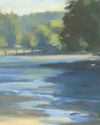
Movement in composition
Through an analysis of three masterworks, landscape painter and noted author MITCHELL ALBALA shows how you can animate landscape composition with movement
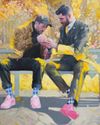
Shane Berkery
The Irish-Japanese artist talks to REBECCA BRADBURY about the innovative concepts and original colour combinations he brings to his figurative oil paintings from his Dublin garden studio

The Working Artist
Something old, something new... Our columnist LAURA BOSWELL has expert advice for balancing fresh ideas with completing half-finished work
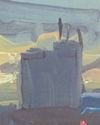
Washes AND GLAZES
Art Academy’s ROB PEPPER introduces an in-depth guide to incorporating various techniques into your next masterpiece. Artwork by STAN MILLER, CHRIS ROBINSON and MICHELE ILLING

Hands
LAURA SMITH continues her new four-part series, which encourages you to draw elements of old master paintings, and this month’s focus is on capturing hands

Vincent van Gogh
To celebrate The Courtauld’s forthcoming landmark display of the troubled Dutch master’s self-portraits, STEVE PILL looks at the stories behind 10 of the most dramatic works on display
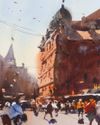
BRING THE drama
Join international watercolour maestro ALVARO CASTAGNET in London’s West End to paint a dramatic street scene
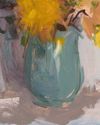
Serena Rowe
The Scottish painter tells STEVE PILL why time is precious, why emotional responses to colour are useful, and how she finds focus every day with the help of her studio wall

Bill Jacklin
Chatting over Zoom as he recovers from appendicitis, the Royal Academician tells STEVE PILL about classic scrapes in New York and his recent experiments with illustration